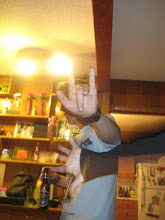THE VIC CHESNUTT BAND
w/ Liz Durrett. The Starlite Room (10030-102 St). Sun, Nov 22 (8pm). Tickets: $20, available through Ticketmaster (451-8000/ticketmaster.com).
“I play music because I inherited this gift,” Vic Chesnutt says over the phone from his Georgia home. “Music has an indescribable impact on me. I find listening and playing it and almost religious experience. It soothes the savage beast — I mean, it is a cliché and it is very true. Something about the way two or three tones come together creates magic and can change things in a big way.”
Sure, Chesnutt’s a bit obsessed with the idea of writing music — probably now more than ever. He penned his first melody when he was five, thousands of others since then that haven’t been recorded, and thousands more wandering his mind that still haven’t even been put down on paper. He says that as he watched his mother write songs and play music as a child, he became educated and inspired. The role music and the people close to him have played in his life started before he could even talk, it seems, and continue to this day.
“I hit it off with these guys immediately,” Chesnutt says, referring to Guy Picciotto and members of A Silver Mt. Zion and Godspeed You! Black Emperor who “back him up” on his latest two albums and current tour. “I’d never met them before we recorded [the 2007 album] North Star Deserter — I didn’t know them personally, but I definitely knew their music. We had a great deal in common both musically and intellectually. It just worked. I’m very lucky to be a part of it.”
It is an overpoweringly beautiful thing to see someone this confident in his art, especially considering the circumstances Chesnutt has faced to get where he’s at. At 18, he was involved in an auto accident that left him paralyzed from the waist down, and although this catastrophe dramatically changed the way in which he lived his life, it didn’t stand in the way of his passion and dedication to his craft. And like most of his material, Chesnutt’s most recent album, At the Cut, stares mortality square in the face. His themes are almost exclusively death and loss, yet there’s a quietly inspiring tone of optimism and hope running through these songs as well. At the Cut and Chesnutt’s new family came at an important time at his life.
“I mean, if I hadn’t broken my neck,” he says, “I’d still be playing music. But meeting these guys — the guys from Silver Mt. Zion and Guy, from Fugazi — was a real boost to my spirits. I was depressed before and I didn’t know what I was doing with my life and with my career. They really gave me a boost — it saved my life.”
The effects have been sonic as well as spiritual for Chesnutt. As anyone who listens to Godspeed can attest to, their distinctive, harrowing arrangements have enough energy and sensation to make something as ordinary as a bus ride seem larger than life; combined that sound with a singer-songwriter as raw and honest as Chesnutt is a potent synergy.
“Playing with those guys is a joyous occasion, man, absolutely joyous,” Chesnutt says. “It’s heavy and really emotional at times. But we laugh and smile a lot because we are interacting and basically jamming. This live show with this band is the best you can get anywhere — At the Cut doesn’t even touch the live show, really. I am a million times better on the stage than on record too because It’s a more complex, emotional thing.
“My longtime fans can’t believe the power of this new band, and the rock ’n’ rollers think it’s the most powerful band a singer/songwriter has ever had. And they’re right — there’s no doubt about that. There has never been a folk singer with a band this powerful. I mean it. It is an emotional experience. Now is not the time not to miss me.”
